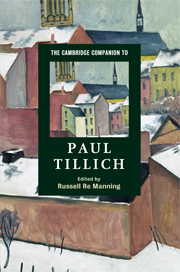Book contents
- Frontmatter
- Part I Standing within the theological circle
- Part II Theology of culture
- Part III Tillich in dialogue
- 14 Tillich in dialogue with natural science
- 15 Tillich in dialogue with psychology
- 16 Tillich in dialogue with Japanese Buddhism: a paradigmatic illustration of his approach to inter-religious conversation
- 17 Tillich and feminism
- 18 Tillich and the postmodern
- Bibliography
- Index
17 - Tillich and feminism
from Part III - Tillich in dialogue
Published online by Cambridge University Press: 28 May 2009
- Frontmatter
- Part I Standing within the theological circle
- Part II Theology of culture
- Part III Tillich in dialogue
- 14 Tillich in dialogue with natural science
- 15 Tillich in dialogue with psychology
- 16 Tillich in dialogue with Japanese Buddhism: a paradigmatic illustration of his approach to inter-religious conversation
- 17 Tillich and feminism
- 18 Tillich and the postmodern
- Bibliography
- Index
Summary
Feminist theology's engagement with male theologians is usually characterized by a mixture of appreciation and uneasiness, and feminist dialogue with Paul Tillich is no exception to this rule. Feminists often object to the abstract nature of Tillich's theology, to androcentric assumptions in his thought and to elements in his personal life that suggest an objectification of women. Yet there has also been some appreciation of Tillich from feminist theologians such as Mary Daly, Judith Plaskow, Susan Lichtman and Mary Ann Stenger. As a matter of fact, feminists might find more points of contact with Tillich than with many other male theologians. These points of contact include a commonly shared concern with issues of social justice, a methodological openness to human experience, an ontology that lends itself to feminist appropriation and even traces of proto-feminist awareness in Tillich. One might posit that his characteristic openness to the political movements around him might have eventually led him into more lengthy conversation with feminist theology, had it been more of a presence during his lifetime. Such a conversation would not be confined to conceptual points, but would take explicit notice of the presence of presuppositions and social locations, thereby including a focus on personal, methodological and doctrinal issues.
- Type
- Chapter
- Information
- The Cambridge Companion to Paul Tillich , pp. 273 - 287Publisher: Cambridge University PressPrint publication year: 2009
- 3
- Cited by



